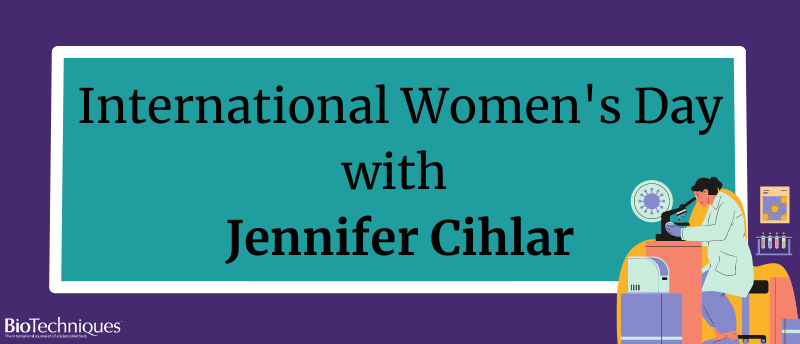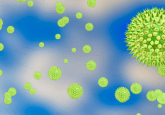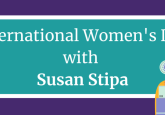International Women’s Day with Jennifer Cihlar

In our International Women’s Day series, we talk to women in STEM to hear more about their research and their interests away from the lab bench.
 Jennifer Cihlar (right) is a forensic geneticist at The University of North Texas Health Science Center (TX, USA) developing new techniques to help solve crimes, highlighting the differences between methods used in the lab compared to forensic analysis. Cihlar is currently a Learn Zone mentor on BioTechniques and here, she talks about the importance of mentors in her own career.
Jennifer Cihlar (right) is a forensic geneticist at The University of North Texas Health Science Center (TX, USA) developing new techniques to help solve crimes, highlighting the differences between methods used in the lab compared to forensic analysis. Cihlar is currently a Learn Zone mentor on BioTechniques and here, she talks about the importance of mentors in her own career.
What excites you most about your job?
The people that I have the opportunity to work and interact with are one of the things that excites me the most about my job. I am constantly surrounded by very motivated and driven individuals, and I believe this pushes me to take chances, grow and be the best version of myself. It also is an honor to be able to discuss my work and learn from these scientists. I have had several great mentors over the years who have had huge impacts on the success and direction of my career.
What are some of the best parts of your job, and your least favorite parts?
For me, every day at work looks a little different. I could be teaching, in the lab working on an experiment, writing a paper, having a conversation with my colleagues, analyzing data or attending a seminar. I like how this keeps things new and exciting for me. However, this also means that time management, organization and planning are extremely important in order to stay on top of all my responsibilities and deadlines.
Could you briefly explain how genomic research is applied in forensics?
Research scientists work towards developing new ideas, technologies and methodologies that can help solve crimes, identify perpetrators, exclude the innocent, bring resolution to victims and families and protect the public. The use of next-generation sequencing technologies in forensic laboratories would be an example of one such technology. Once these technologies or methodologies have been heavily tested, optimized for the types of samples forensic laboratories process, and published on, forensic laboratories will purchase and implement them into their routine workflows if they are applicable to the types of evidence and cases their laboratory processes.
What made you interested in the field of forensic genomic research?
My interest in forensic science was largely driven by my dad’s passion for his own law enforcement career. My decision to work in forensic genomic research came over time (and a lot of college courses) as I discovered that I enjoyed the opportunity to come up with new ideas and see them through to an actionable and applicable product.
Is there a difference between the techniques developed for forensic analysis and those used in research?
One difference to keep in mind is the types of samples that different disciplines may be working with. Forensic analysts routinely encounter samples that contain low amounts of DNA, degraded DNA or DNA from multiple sources. Methodologies and software with the potential to be used in forensic laboratories have to be designed and optimized with this distinction in mind.
What did you always want to be?
I grew up with my dad working in the law enforcement field. Seeing how much he enjoyed his job and the impact he had on the community and people around him cemented my desire to work in the same field. Once I discovered that I also really enjoyed science, forensics became the path that I sought for my career.
What is your morning and evening routine?
My family’s morning routine involves getting everyone up, dressed, fed and ready to tackle the day successfully, whilst in the evening we spend more quality time together. A typical evening involves long walks around the neighbourhood where we talk about our day or other things coming up in the week, dinner and watching our favorite tv shows together.
What’s your favorite thing to do in your downtime?
My favorite thing to do in my downtime is either spend time with my family or enjoy some live music!
What challenges do you face day to day as a woman and how do you balance these with your working life?
For me, one of the biggest challenges is maintaining a healthy work/life balance. I have lots of incredibly important roles in life: wife, mother, daughter, sister, friend, pet owner, scientist, etc. I have to routinely remind myself that each of these roles in my life deserves a portion of my time and undivided attention.
Who is your inspirational hero?
My mother has always been my inspirational hero. She also works in the service industry as a teacher and, after over 30 years, still loves what she does. While many of the days in her teaching career were long and hard, the pride and joy in seeing her students succeed always seemed to refuel her, and this attitude carried through at home as well. It didn’t matter what activity, hobby, job or goal my sister and I had; my mother was there to make sure she could help us be as successful as possible. I can only hope to have a positive impact on as many people as my mother has throughout her life.





